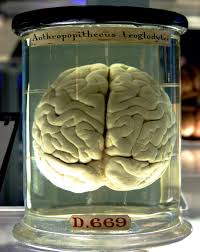The National Institute of Mental Health (NIMH) is increasingly shifting its research emphasis toward attempting to uncover biomarkers for “mental diseases,” which may have dramatic consequences for research and training in clinical psychology. In an article to be published in next month’s Professional Psychology: Research and Practice, Marvin Goldfried outlines how the shift in funding priorities for psychological research is tied to the needs of pharmaceutical companies and the biological model in psychiatry.
For nearly thirty years the NIMH has largely funded psychological research that utilized randomized control trials (RCTs) and tested “disorders” identified in the Diagnostic and Statistical Manual of Mental Disorders (DSM). Because the diagnostic categories listed in the DSM merely describe symptoms, this line of research rested on an “essentially weak empirical foundation.”
 “Specifically, the model shift brought with it a number of significant unforeseen consequences, Goldfried writes. “It not only changed how we conducted research, but also how we began to think about clinical problems, especially through the medical lens—namely the need to diagnose and treat disorders.”
“Specifically, the model shift brought with it a number of significant unforeseen consequences, Goldfried writes. “It not only changed how we conducted research, but also how we began to think about clinical problems, especially through the medical lens—namely the need to diagnose and treat disorders.”
Goldfried points out that the RCT and DSM focused research demanded a consistency in practice that “manualized” therapy and failed to take into account individual differences. The DSM limited researchers to seeing a patient with symptoms associated with both anxiety and depression, for example, as being “comorbid,” or having two underlying medical conditions. “What was not considered within this model is that two clinical problems, such as anxiety and depression may co-occur because they are functionally related.”
The NIMH is now shifting its emphasis from RCTs to translational research, which they hope will get away from the limitations of the DSM and help uncover “underlying causes.” The new NIMH research priority is being called Research Domain Criteria (RDoC) and some see the shift away from RCTs as a potential opportunity to ‘become free of the restraints associated with the DSM.”
Goldfried cautions, however, that the new RDoC emphasis may threaten to disregard psychotherapy research in favor of the quest to uncover biological causes of disorders to develop more drugs. “What has not been emphasized in the literature is the fact that the RDoC focus stems from the desire to develop more effective psychoactive drugs for the treatment of brain diseases,” he writes.
“Although the RDoC priority is presented as being preliminary, and makes passing reference to the importance of psychosocial treatments— especially cognitive behavior therapy—the primary focus is based on the premise that psychological problems are best understood as ‘disorders of brain circuits,’ and that they are therefore subcategories of medical disorders. Whether or not our knowledge of brain chemistry or other biological factors will help us to develop better drugs to treat psychological problems is clearly an open question. It has been vigorously argued that the reductionistic approach of RDoC is unlikely to succeed in capturing the nuances and varieties of psychological problems.”
Goldfried also warns that the shift toward neuroscience in the NIMH could also transform academic psychology programs and clinical training. As Universities attempt to hire faculty who are likely to bring in grant funding, many psychology departments will recruit faculty with neuroscience research experience and, as a result, many clinical psychology programs will attempt to meet this demand by adding neuroscience research to their training programs.
“This possible change in the clinical psychology curriculum is not unlike what happened in psychiatry departments when they shifted from an emphasis on psychotherapy to biological psychiatry,” he adds, when “there was a mass exodus of psychodynamic faculty from psychiatry departments.”
*
Goldfried, M. R. (2015). On Possible Consequences of National Institute of Mental Health Funding for Psychotherapy Research and Training. (Full Text)















This is amusing… “Whether or not our knowledge of brain chemistry or other biological factors will help us to develop better drugs to treat psychological problems is clearly an open question.”
Given that drugs don’t in any way “treat” psychological problems, but rather acts as tranquilizers or uppers, it’s not an open question.
The reductionistic biological approach to “treating” mental problems is already doomed. Because individual psychological and life problems don’t work in the reductionistic linear way psychiatrists assume, no reliable biomarkers will ever be found for the mythical beasts schizophrenia, depression, and the rest of the menagerie. The attempt to find these imagined biomarkers is about as likely to succeed as humanity is to send a live astronaut across millions of light years to the Andromeda galaxy.
Tick tock, tick tock…
The clock is ticking on these deceptions.
Report comment
Ironically, I just got out of a class and the topic was what kind of NIH grants get funded. The general consensus was that NIH tends to be most likely to award “innovative” grants. To me that is a big reason why you see them funding more of the biological based studies. Biomarkers, fancy expensive GWAS studies are seen as “innovative”, and therefore more fundable than boring old psychotherapy.
Report comment
The brain is hardware, the mind and thinking and the emotional response to ones thinking is software.
Go ahead and spend billions on research , my bet is they will never find a bio-markers to go with any DSM labels.
Report comment
And this is assuming we are just chemical robots with no souls.
Report comment
The objections on this site to biological research for mental illness are scary . I hate the DSM as much as most of you seem to but for the opposite reason. I think mental health care needs to be more bio based & finally make a complete break from psychiatry’s insane psychoanalytic roots . The failure to find bio markers lies not in the concept that mental illness has biological roots but in haphazard research methodologies based on artificial DSM diagnoses that don’t accurately reflect real-world brain biology. If physicists were as short sighted as either DSM oriented mental health researchers/practitioners or their anti-psych opponents the Higgs-Boson would have never been discovered. Hopefully Rdoc will eventually lead to a genuine medical model to replace the pseudo medical DSM. While I am disappointed that NMIH hasn’t tossed DSM out the window yet, they do seem to at least be making a move toward better research than has been conducted in the past.
Report comment
correction NIMH not NMIH insomnia is a b*@ch.
Report comment
So many studies have shown that interventions directed at the ‘mind’ changes brain structure (we call it neuroplasticity). This is what needs to be researched as I have elaborated further in my other post here.
Report comment
So many studies have shown that interventions directed at the ‘mind’ changes brain structure (we call it neuroplasticity). Yet, drug companies keep trying to develop drugs for mental illnesses.
If we take Alzheimer’s disease for example, drug companies keep trying to develop drugs to prevent plaque formation in the brain. Yet, programs directed at the ‘mind’ (such as mindfulness programs) have consistently shown that these programs prevent plaque formation in the brain and also positively change brain structure.
Think of the following scenario: skeletal muscles waste away if they are not exercised regularly. We know this as a causal fact – therefore, we do not focus energies on developing a drug to prevent muscles from wasting away.
Likewise, less activity in the mind (such as when engaged in meditation exercises) is linked to less activity in the default mode network of the brain. Less activity in the default mode network of the brain leads to favorable structural changes in the brain (neuroplasticity). High activity of the default mode network (e.g. proliferation, worry, rumination, etc.) leads to mental illness (psychological studies support this). Further, high activity of the default mode network leads to adverse structural changes in the brain.
As I see it, this is the causal pathway that should be followed by research and investigated further.
Report comment